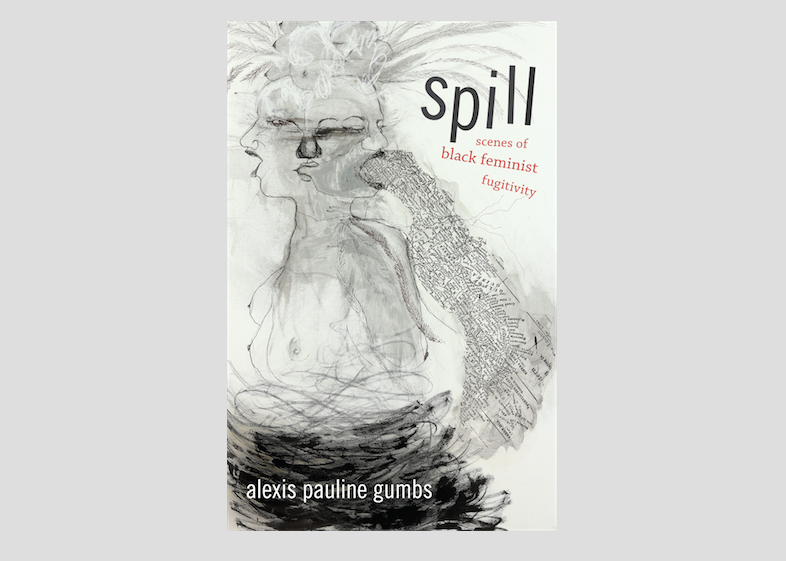Duke University Press has allowed us to publish an excerpt from Alexis Pauline Gumbs’ fantastic new book Spill: Scenes of Black Feminist Fugitivity, which can be purchased here. These passages come from a chapter titled “How She Survived Until Then.” Read Marquis Bey’s accompanying interview with Gumbs here.
*Excerpts from “How She Survived Until Then,” are from Spill, Alexis Pauline Gumbs, pp. 45-60. Copyright, 2016, Duke University Press. All rights reserved. Republished by permission of the copyright holder. www.dukeupress.edu. This material is not under this site’s CC license.
maybe it was her mother for her coathanger nettle tea free arrival on the planet. maybe it was her father for staying home at night for once. who knows? maybe it was the god of Abraham for not thinking about daughters. maybe it was that bush she fell into for not being rose or burning. maybe it was her siblings leaving food for her in her slowness. maybe it was the soda jerk for looking the other way. maybe it was the school teacher for making her clean all the chalkboards. maybe it was the teacher’s pet for not making her stay. maybe it was the crossing guard for staying ten minutes extra. maybe it was the trees for making her green skirt blend in. maybe it was pastor himself always trying to seem so free of sin. maybe it was the murderer himself for thinking boys are better prey. maybe it was her strong ankles from that brief stint at ballet. maybe it was all thanks to ma’dear for constantly making her pray. maybe it was the echo on the sidewalk for having something to say. maybe it was inherited swiftness in her legs that let her run home that day. but the boogie man didn’t quite catch her. so thanks. either way.1the ambiguities of mercy A Hateful Passion, A Lost Love, 113
she doesn’t remember the first time she landlocked cursed. maybe it was the wet in the voice of an uncle, not a sailor but in love with his boat of a car. he had no legs for land, she could tell that. maybe it was the oil dirty words he used to talk about the cadillac that she knew were mouthsize love, public but unknowable, intimate for all to jealous see. she whispered to make her mouth her own, thinking these were things that her mother would not say, this was how she could change the content and the shape of her face, not just the order and arrangement of her resignation. and around her small friends she felt grown in the tongue like a person who knew things that she had no way to know. and in church she felt guilty and repented every week. she was playing prophet to her own scandalous adulthood, she was praying for it, calling it forth like her girl future could be slick, like she would slide through days uninhibited into the next. but she was wrong. curse on her lips notwithstanding she could not escape the rhythm of traction and sand of creating the world every day with her hands just like the women her uncle gas tank sailed away from. she could have spit, but she just sucked her teeth.2language does speak Ellison’s Usable Past, 66
she is biting her nails again. some story about where she ends even as dead skin steels itself strong and something else. she is pulling out her hair again thinking there must be a limit to the cloud of secrets growing out. she is skin or so she thinks again. she is bone or so the floorboards tell her. she is fat and all the old ones smile because it will not protect her from what she knows. the difference between sunlight and her face is only scale. the difference between her mouth and music is starting and stopping. the difference between her hands and stars is proximity to the window. the difference between earth and her sweet brown skin is not so much now that she blinks about it. she is eating dirt again. preparing.3but the fiction of differences is something else again Introduction, 21
her fingers rake the dirt pull the roots eat the hurt under her nails. enter earthworm. enter snails. center trails laid by the sweetest decomposers. cue the music start the rain press the chest in to stain the housedress half-life. hold the trowel hold the hoe hold the spade this will be played out by hand now. heap the heartache heap the tears pour the solitary years into the land now. grind the gristle round the womb compost tomb best hope and channel to rebirth now. kiss the limestone grasp the shells sweat your song into the well groundwater heavy. pray for lightning push for loud, hone in on rainstatic radio shroud and sound like summer. wind is the drummer cymbal through remember everything you do becoming flowers. becoming squash becoming fern. remember everything you learn will soon out green you. remember. everything you forget will grow.4an important ground-clearing exercise Introduction, 34


